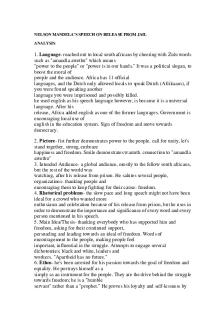Transformational Leadership - Nelson Mandela PDF

| Title | Transformational Leadership - Nelson Mandela |
|---|---|
| Author | McKenzie Murphy |
| Course | Leadership Decision Skills |
| Institution | Miami University |
| Pages | 2 |
| File Size | 67.4 KB |
| File Type | |
| Total Downloads | 73 |
| Total Views | 154 |
Summary
Download Transformational Leadership - Nelson Mandela PDF
Description
Transformational Leader: Nelson Mandela Nelson Mandela was a nonviolence anti-apartheid activist, politician and philanthropist who became South Africa’s first black president from 1994 to 1999. His passionate and strong feelings toward civil rights began when he was 16 when the main speaker at the traditional African circumcision ritual, spoke sadly of the young men, explaining that they were enslaved in their own country. Because their land was controlled by white men, they would never have the power to govern themselves, and would be squandered as they struggled to make a living and perform mindless chores for white men. (Biography) Although he didn’t fully understand at the time, this in turn led him to formulate his resolve for an independent South Africa. Throughout his career, Mandela used talk to transform situations, but he also knew when and how to fight. He understood that to effect social transformation, fighting is essential, but that if we take fighting too far then we risk destroying what we are trying to create. In contrast, if we take dialogue too far then we risk compromising on what is most important to us. (Kahane, 2013) I think his major success came from his understanding of having a perfect balance between the two. In this aspect, his views on democracy, equality, and freedom remained unchanged. One of his most well-known speeches is titled “I Am Prepared to Die”. During the three-hour speech, he raises the level of morality in the audience when he says, “I have cherished the ideal of a democratic and free society in which all persons will live together in harmony and with equal opportunities… it is an ideal for which I am prepared to die.” (Mandela, 1964) While inspiring followers through talk is virtuous, Mandela understood that sometimes, silence is good since talk was also about communication, which is a two-way street. His engagement with others involved listening to them and he attended to the needs and motives of his followers, helping them reach their fullest potential by learning and adapting to what they were telling him. He created connections with others through talk, by helping them interact not only with him but with each other, forming a base for teamwork. Looking at the Leadership Continuum, Mandela falls into Factor 1 of Transactional Leadership, known as charisma or idealized influence. This describes leaders who act as strong role models for followers, followers identify with these leaders and want very much to emulate them. (Northouse, 2016, 167) Mandela is viewed as a leader with high moral standards and a vision for South Africa that resulted in monumental change in how the people of South Africa would be governed. His charismatic qualities and the people’s response to them transformed an entire nation. (Northouse, 2016, 168) For generations, Nelson Mandela’s transformational leadership style was a huge source of inspiration for civil rights activists’ worldwide. Those who wish to effect social transformation like him should also learn to do the same.
“It is better to lead from behind and to put others in front, especially when you celebrate victory when nice things occur. You take the front line when there is danger. Then people will appreciate your leadership.”
References
Denning, Steve. “Nelson Mandela: A Leader Who Listened.” Forbes. 8 Dec. 2013. Accessed 23 Apr. 2018. Retrieved from: https://www.forbes.com/sites/stevedenning/2013/12/08/nelson-mandela-a-leader-wholistened/#38d984a575ba Kahane, Adam. “Nelson Mandela knew when to talk and when to fight.” opendemocracy. 13 Dec. 2013. Accessed 23 Apr. 2018. Retrieved from: https://www.opendemocracy.net/transformation/adam-kahane/nelson-mandela-knewwhen-to-talk-and-when-to-fight Northouse, P. (2015). Leadership: Theory and Practice. 7th ed. SAGE Publications, Inc. “Nelson Mandela Biography.” Biography. Accessed 23 Apr. 2018. Retrieved from: https://www.biography.com/people/nelson-mandela-9397017 “Nelson Mandela Speeches.” Nelson Mandela Foundation. 20 Apr. 1964. Accessed 23 Apr. 2018. Retrieved from: http://db.nelsonmandela.org/speeches/pub_view.asp? pg=item&ItemID=NMS010 “Top 10 NELSON MANDELA QUOTES.” BrainyQuote. Accessed 23 Apr. 2018. Retrieved from: https://www.brainyquote.com/lists/authors/top_10_nelson_mandela_quotes...
Similar Free PDFs

Articolo Nelson Mandela
- 11 Pages

Biografia Nelson Mandela
- 2 Pages

Nelson Mandela Biography
- 1 Pages

Saving Nelson Mandela Notes
- 2 Pages

Nelson Mandela Case
- 2 Pages

Nelson Mandela Rules (terjemah).pdf
- 80 Pages

Myths and heroes Nelson Mandela
- 1 Pages
Popular Institutions
- Tinajero National High School - Annex
- Politeknik Caltex Riau
- Yokohama City University
- SGT University
- University of Al-Qadisiyah
- Divine Word College of Vigan
- Techniek College Rotterdam
- Universidade de Santiago
- Universiti Teknologi MARA Cawangan Johor Kampus Pasir Gudang
- Poltekkes Kemenkes Yogyakarta
- Baguio City National High School
- Colegio san marcos
- preparatoria uno
- Centro de Bachillerato Tecnológico Industrial y de Servicios No. 107
- Dalian Maritime University
- Quang Trung Secondary School
- Colegio Tecnológico en Informática
- Corporación Regional de Educación Superior
- Grupo CEDVA
- Dar Al Uloom University
- Centro de Estudios Preuniversitarios de la Universidad Nacional de Ingeniería
- 上智大学
- Aakash International School, Nuna Majara
- San Felipe Neri Catholic School
- Kang Chiao International School - New Taipei City
- Misamis Occidental National High School
- Institución Educativa Escuela Normal Juan Ladrilleros
- Kolehiyo ng Pantukan
- Batanes State College
- Instituto Continental
- Sekolah Menengah Kejuruan Kesehatan Kaltara (Tarakan)
- Colegio de La Inmaculada Concepcion - Cebu








